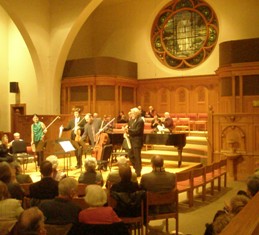The Linton
Music Series has connections. Through
the Cincinnati Symphony Orchestra and the musicians who form its core
membership.

Those connections served Linton well on a program Sunday afternoon (Dec. 5) at First Unitarian Church in Avondale. In fact, it might have been called “Peter Wiley and Friends.”
Wiley, a former principal cellist of the CSO, was also a founding member of Linton Music (in 1977). Wiley currently teaches at Philadelphia’s Curtis Institute of Music and has a cadre of young artists constantly in his sights. He and his former Guarneri Quartet colleague, violinist John Dalley, introduced three of those young artists to Linton, pianist Anna Polonsky, violinist Benjamin Beilman and violinist/violist Tien-Hsin Cindy Wu.
It made for an exciting concert and a fresh look at some of the young talent out there. It was a kind of mix-and-match, too, with Beilman, Dalley and Wu taking turns on first violin and Dalley and Wu alternating on viola.
Beethoven was their entre, i.e. his Variations for Piano, Violin and Cello, Op. 44, with Dalley on violin. It is a charming early work, which, with recent scholarship pegging the source of Beethoven’s theme, may yet come to be known as Variations on Red Riding Hood. Beethoven scholar Sieghard Brandenburg recently located the theme in Carl Ditters von Dittersdorf’s 1788 comic opera “Das Rote Käppchen” (“The Red Cap”), a favorite in Bonn at the time Beethoven wrote his Variations. Dittersdorf’s arpeggiated, tip-toe-like theme got affectionate treatment in Beethoven’s hands, and the Linton musicians put abundant character in all its guises.
Following immediately afterward was Shostakovich’s Piano Quintet, Op. 57 -- a strategic placement, if not intended as such. Here is Shostakovich, reacting as only he could to the tyranny of the Soviet regime, while at the same time, earning a Stalin Prize of 100,000 rubles (largest amount ever awarded for a piece of chamber music). Beethoven, too, lived under authoritarianism, but people laughed about it differently in those days, and in fact, the Enlightenment was also under way.
Beilman, just 20 and a student at Curtis, played first violin in the Shostakovich, with Dalley on second violin and Wu on viola. The fit was perfect. Wiley announced the blistering theme of the Prelude, which was taken up in kind by the other players for a powerful opening statement. The second movement, a seemingly gentle Fugue, seethed with quiet intensity (and quoted from Shostakovich’s Symphony No. 5, another work full of hidden meaning). Polonsky hammered out the Scherzo as Shostakovich himself liked to play it, like a xylophone, for a jeering, thumb-nosing effect. It became quite a melee at times, with Beilman, Wu and Wiley blazing away. Wiley played to more weasely effect at one point, making for a delightful contrast.
The Intermezzo movement went from plaintive to passionate, with Beilman venting in the violin’s highest register, while the Finale breathed a sense of triumph over adversity.
Dvorak’s famous “American” Quartet was performed after intermission. Wu played first violin, with Beilman on second and Dalley on viola. Dalley put lots of heft into the viola solo in the first movement, as opposed to Wu’s tender read of the gentle opening melody. The Negro spiritual-like Lento (compare the Largo of his “New World” Symphony) was heart-rending, extra kudos to Wiley here. The third movement was chirpy good fun – the first violin excerpts the song of a bird that frequented Dvorak’s window sill as he was composing the quartet -- and the final Vivace skittered merrily along. The quartet played as one and ensemble was irreproachable.
Note: It was illustrative of another Linton “connection” that Polonsky is married to pianist Orion Weiss, guest artist with the CSO Dec. 3 and 4. Linton often features CSO guests as an extension of their visits to Cincinnati. Guest artist on Linton’s next concert Jan. 30, 2011, will be pianist Andre Watts, that weekend’s CSO guest. Information at www.lintonmusic.org